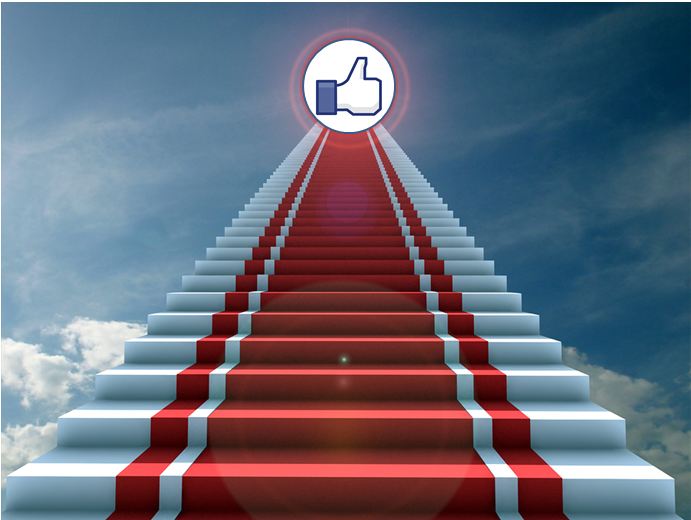There is a particularly funny scene in the Will Ferrell movie Elf when he passes a run-down looking coffee shop that has a sign saying “World’s Best Cup of Coffee.” With exuberant joy, he bursts into the shop and yells “Congratulations!”
It’s a hilarious moment, but a common example of “social proof” that has been used in the advertising world for decades. When we don’t know the truth, we look for clues from our external environment (like a claim in a storefront window) to help us make decisions.
Social proof is not always true or accurate, it just has to provide an effective impression of authority.
In my book Return On Influence
Young was an accomplished radio, film, and television actor who represented the iconic All-American father in the 1950s TV series “Father Knows Best.” In the 1970s he reprised this squeaky-clean in an even more famous character — the gentle, and trusted “Marcus Welby, M.D.” In fact he became so tied to this character that it was impossible NOT to think of him in this role in any subsequent role or appearance he earned.
Despite his trademark portrayal of these happy, well-adjusted characters, Robert Young’s reality could not have been more different. He admitted to being a terrible father and husband, and was often described as a bitter man. He suffered from depression and alcoholism, and spoke openly about a suicide attempt in the early 1990s.
Yet during this same timeframe, Young was among America’s most popular television commercial spokespersons – utterly in contrast to his tormented personal reality.
Brands capitalized on his social proof as a TV doctor and extended all of those powerful positive attributes to their products, even though the man wrapped in the white lab coat was suffering as a human being.
The essence of social proof
In the online world, “social proof” is paramount … and easily achieved because anybody can appear to be pumped-up and important, even when they’re not.
There has never been a time in history where the mantle of authority has been so effortlessly assumed and promoted. Words like “best-selling,” “award-winning” and “expert” have become meaningless.
And yet in our information-dense world of the Internet, we’re starved for clues to help us determine leadership and authority and we readily turn to “badges of influence” like number of Twitter followers or even a Klout score as convenient indicators of power.
Perhaps the most prestigious symbol of social proof today is the Facebook “Like.” Among many companies, there is a Facebook arms race in progress as competing brands do anything necessary to gain the upper hand on this important metric. I recently wrote a post describing a company who has an internal marketing metric of “cost per like.” On the surface, this seems ludicrous but it demonstrates how strategically important this symbol has become.
Let’s go shopping for Likes
As you might predict, an underground market has emerged that will happily sell you manufactured Facebook Likes. A search turned up a market price of $199 for 10,000 likes.
A client recently asked me if this was a legitimate way to build their social proof, especially if their competitor is doing it. My instinct said no. As much as I’ve written about the need to be trustworthy and authentic on the social web this tactic seems unethical.
But the more I consider this, the more I wonder if this position is hopelessly naive. Let’s face it, for many brands, social media has become another advertising channel. Almost every corporate Facebook account I know of is run, at least in part, by an advertising agency.
If we look at Facebook in terms of being just another advertising platform (which it is) then what’s the difference between pumping up your Facebook account with fake Likes and …
- A Twitter account that is primarily populated by empty accounts and spambots? (This is the case for almost every person with a massive Twitter following.)
- A badge on your site claiming your blog is one of the “Top blogs of …” when it was simply a popularity contest that you manipulated by encouraging friends and family to do mass voting?
- Claiming “four out of five doctors …” when you really have no idea what the study was about or how it is being applied to the advertising claim?
- Claiming to be an “expert” or “guru” when you’ve never had a paying customer?
I don’t see any outcry against these examples of social proof … in fact chances are good that you may be participating in something like this yourself somewhere on your social profile. If we are willing to look the other way on these other trumped-up claims, why is there such an emotional backlash when it comes to Facebook?
The business case for buying Likes
While we pontificate about the imperative for “authenticity,” when you get down to it, nobody really cares. Like the case of Robert Young, reality plays no role in manipulating people’s perceptions about authority.
I run my business and my life with integrity. Not only do I avoid anything unethical, I avoid anything that even LOOKS unethical.
But I’m wondering if it is irresponsible and out of step with reality to keep a customer from buying Likes to match a competitor that is already doing it. If I only built an organic following for this customer, it will put them at a competitive disadvantage … and at the end of the day somebody coming across their page won’t care any way.
There is a practical business case for being a Facebook fake, right?
Illustration based on art from BigStock.com
